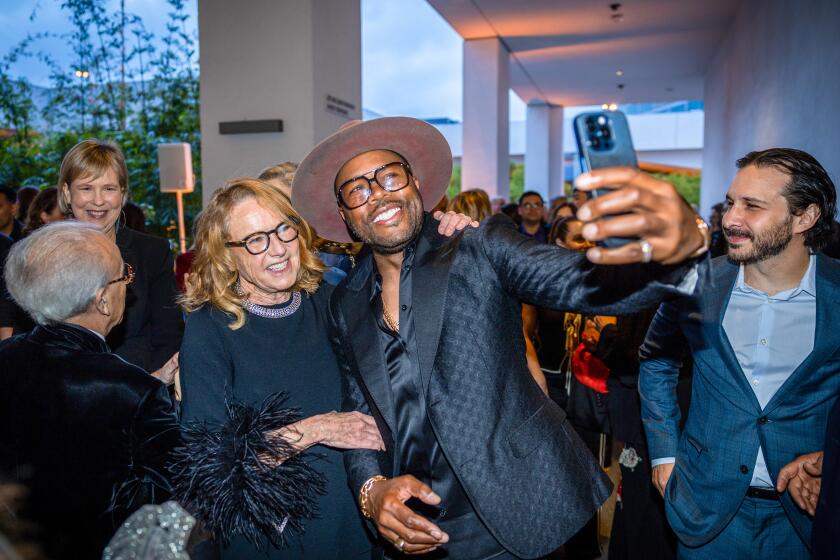For Seniors, Life Is a Cabaret : Nursing homes: A woman’s care for her mother prompted her to organize a group of traveling musicians to brighten the lives of the elderly.
About 40 elderly people--mostly women--sat unmoving in wheelchairs in the activity room of the Tarzana Health Care Center nursing home one Sunday afternoon. Faded red, white and blue streamers left over from the Fourth of July hung on the walls, along with some calculatedly neutral decorator landscapes. There was little talking. Some of the residents slumped forward, half-asleep. Others sipped medication.
A statuesque, effervescent woman strode into the room in a lovely floral dress. A pianist began to play, and the woman, Sonia Flaum, broke grandly into song. Many songs. “When Irish Eyes Are Smiling,” “Let Me Call You Sweetheart,” “Around the World,” “Ain’t She Sweet,” “You Are My Sunshine,” “My Melody of Love,” “Those Were the Days,” “Bye, Bye Blackbird.”
Old hands clapped. Old eyes opened and brightened a little. Old feet shuffled in time. Old voices wobbled to life and sang along with Flaum’s vivacious soprano.
Pack up all your cares and woes
Here I go, singin’ low
Byyyyeeee, Byyyyeeee . . . Blackbird . . . .
And no one in the room at that moment was happier than Rena LeBlanc, organizer of this traveling cabaret show, which for the past three years has visited nursing homes throughout the San Fernando Valley.
“I started this because my mother was in nursing homes for many years,” said LeBlanc, a Woodland Hills free-lance writer. “It was a nightmare experience for me. I saw a lot of neglect. At one point, she was near death, and she was not responding. . . . I would visit her maybe two or three times a week, but I felt more was needed, so I advertised for a musician to come and perform for her. I got a young woman who played the flute. . . . My mother began to respond more, and she got better.
“I began to bring cassettes and play Yiddish music for my mother and others who liked that kind of music. . . . I could see from these two things how much joy this music brought to these people. . . . Music is medicine for the soul.”
British-born Flaum, a lifelong professional performer who, with pianist Wayne Behlendorf has formed the mainstay of LeBlanc’s cabaret, agreed. “The thrill is when they come in, and they’re all down and medicated or whatever, and you sing for them--and it just wakes them up!” she said during a break in her performance. “And then you feel good, you know?”
“After I finish, no matter how tired I’ve been, when I see the look on their faces, I don’t feel tired any more,” Behlendorf said.
LeBlanc’s mother passed away in 1979. And LeBlanc’s vague plans for bringing music to nursing homes finally coalesced three years ago, as an outgrowth of her “Opera Encores”--private parties she organizes for single opera lovers.
Many of the professional musicians--such as Flaum and Behlendorf--at the parties gladly volunteered to help with the nursing home cabaret, and there have been monthly shows since.
“I want to use every power I have to try to change things in the homes, because I saw such horrible things, and horrible things happened to my mother,” LeBlanc said. “There are wonderful people working in nursing homes, but there is so much wrong that has to be made better, and that’s why I’m doing the cabaret and the other things.”
The “other things,” at the moment, are an ABC movie of the week, produced by David Wolper and starring Fred Savage, “The Legacy of Michael Patrick Smith,” to air this fall. It is based on LeBlanc’s series of Reader’s Digest articles about a Colorado muscular dystrophy victim who sued the federal government on behalf of all nursing home patients.
LeBlanc plans to start a newsletter later this year aimed at nursing home patients and their families, encouraging them to seek the best possible care.
In the meantime, there’s the cabaret, which is becoming something of an institution at Valley nursing homes--sometimes not totally appreciated.
“Sometimes the staff has forgotten we’re coming, and we have to actually help them move people into the activity rooms,” said LeBlanc. “It’s kind of disappointing that in some nursing homes, they still don’t see to it that the people are ready. Some are delighted to have us come.”
Tarzana Health Care’s staff is among those that are delighted.
“In this day and age,” said Michael Menkin, who for 20 years has been recreation director at Tarzana Health Care, “when everybody has their hands out, any group or people that just come because they want to really bring happiness and entertainment to nursing homes is very special. I mean, a lot of people will come and say, ‘I do an hour, and it’s $40.’ But Mrs. LeBlanc and the others do this all voluntarily.”
And the patients react with obvious pleasure. One Tarzana Health Care resident--Gwendolyn Van Enger--raised her hands high over her head and swayed from side to side in her wheelchair as Flaum sang “Those Were the Days.”
Another, Edna Hanson, who in pearls, full makeup, and fur wrap looked ready for an evening at the music center, drew herself up in her chair, smiling. “Of course, I can’t dance,” she said, “because I have this broken and that broken, but I was very good before!”
At one cabaret performance, a woman actually rose from her wheelchair and began waltzing to the Flaum/Behlendorf accompaniment. At another, Flaum was singing “I Hope You Live to Be a Hundred” when a creaky voice retorted, “I am 100! I’m a hundred-and- one !” (The tune has since been dropped from the repertoire.)
Some audience members sing along in their own words, or their own key--and others know every word and note of every song. “Last time we sang here,” said Flaum, “there was a woman who used to be an opera singer, and everything I sang, she sang with me! It was so hilarious. It was wonderful. And you could still hear the beauty in her voice.”
This is no easy gig. Flaum admitted to “having to take a short walk” after the time a man came to visit his wife, a nursing home resident, to celebrate their “50th or 60th” wedding anniversary. Flaum sang them a love song from their youth.
“Sometimes it gets a little overpowering,” said pianist Behlendorf. “You have to be a little tough, and some entertainers can’t take it. But we need more people to do this. . . . You know, people are always crying about how they have no place to sing or entertain. This is a great way to break into show business.” (He might be right. Broadway singer Michael Feinstein, the noted Gershwin specialist, got his start in nursing homes.)
At the Sunday afternoon cabaret in the Tarzana Health Care Center, former operatic soprano Paula Roy of Canoga Park, a new cabaret volunteer, sang “Torna, Sorrento.” One woman reached out her hands, and Roy took them in her own, as the patient smiled wistfully and rocked to and fro. Then Flaum took the stage again.
“You know what?” she said. “I’m going to take you for my little trip around the world! Because we can’t really go right now! How about that? Is that OK?”
And again, old hands clapped. Old eyes opened and brightened a little. Old feet shuffled in time. Old voices wobbled to life and sang along with Flaum’s vivacious soprano:
It might have been in County town,
or in New York or gay Paree, or even London town
No more will I go all around the world
Till I have found my world in you . . .
More to Read
The biggest entertainment stories
Get our big stories about Hollywood, film, television, music, arts, culture and more right in your inbox as soon as they publish.
You may occasionally receive promotional content from the Los Angeles Times.






